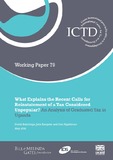| dc.contributor.author | Bakibinga, David | |
| dc.contributor.author | Kangave, Jalia | |
| dc.contributor.author | Ngabirano, Dan | |
| dc.coverage.spatial | Uganda | en |
| dc.date.accessioned | 2018-05-24T09:53:19Z | |
| dc.date.available | 2018-05-24T09:53:19Z | |
| dc.date.issued | 2018-05-21 | |
| dc.identifier.citation | Bakibinga, D; Kangave, J; Ngabirano, D. (2018) What Explains the Recent Calls for Reinstatement of a Tax Considered Unpopular? An Analysis of Graduated Tax in Uganda, ICTD Working Paper 79: Brighton | en |
| dc.identifier.uri | https://opendocs.ids.ac.uk/opendocs/handle/20.500.12413/13771 | |
| dc.description.abstract | Successful decentralisation relies heavily on the ability of subnational government to generate its own revenue. In many African countries, subnational government is authorised to collect a variety of taxes and user fees including trade licensing taxes, property taxes, market fees, garbage collection fees and road user fees. With the exception of property taxes, which have the potential to generate significant revenue, most other taxes collectively fund a very small proportion of subnational government budgets. Until recently, one of the main sources of own revenue for subnational government in Uganda was a poll tax known as graduated tax. Tanzania and Kenya had a similar tax, referred to respectively as the development levy and graduated personal tax. However, the tax was abolished in Kenya in 1974, in Tanzania in 2003 and in Uganda in 2005. The reasons for abolishing the tax in the three countries were similar, and included the fact that it relied on coercive enforcement, the costs of collection were quite high and it disproportionately affected the poor. In Uganda, however, there have recently been calls – within and outside government – for the reintroduction of the tax. Our research seeks to answer the question: what explains the calls for the introduction of a tax that was largely unpopular? We find two main explanations. First, graduated tax was the main source of revenue for local government in Uganda and there has been no adequate replacement for it. Second, the tax was a symbol of pride for some men, and encouraged productivity. Women – particularly in rural areas – feel that its abolition reduced the productivity of men. | en |
| dc.description.sponsorship | Department for International Development (DFID) | en |
| dc.description.sponsorship | Bill and Melinda Gates Foundation | en |
| dc.language.iso | en | en |
| dc.publisher | IDS | en |
| dc.relation.ispartofseries | ICTD Working Paper;79 | |
| dc.rights.uri | http://creativecommons.org/licenses/by-nc/4.0/ | en |
| dc.subject | Governance | en |
| dc.title | What Explains the Recent Calls for Reinstatement of a Tax Considered Unpopular? An Analysis of Graduated Tax in Uganda | en |
| dc.type | IDS Working Paper | en |
| dc.rights.holder | © Institute of Development Studies 2018 | en |
| dc.identifier.team | Governance | en |
| rioxxterms.funder | Default funder | en |
| rioxxterms.identifier.project | Default project | en |
| rioxxterms.version | VoR | en |
| rioxxterms.funder.project | 9ce4e4dc-26e9-4d78-96e9-15e4dcac0642 | en |


